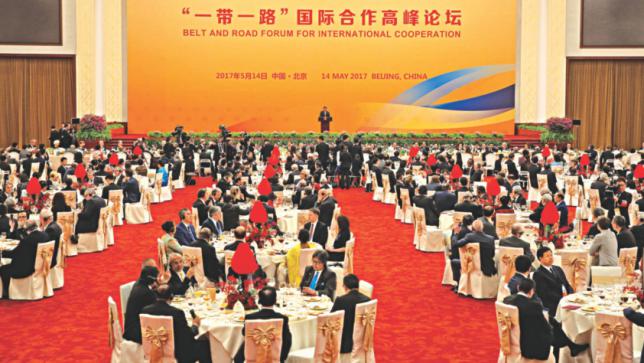For global banks, China's new "Silk Road" is a tantalising concept: billions of dollars in deals, loans and advisory fees, and a cosier relationship with Beijing for those who step up.
Dozens of senior international bankers turned up at the weekend for a Beijing summit to promote China's "Belt and Road" initiative, an ambitious plan to open new trade corridors across the globe using roads, power lines, ports and energy pipelines.
But commercial considerations, higher funding costs and compliance worries are holding Western lenders back, and some bankers say the situation is unlikely to change.
That leaves the bulk of the action with China's policy lenders and commercial banks, who are already bankrolling most key projects in some of Asia's most challenging environments.
"This is not something that will help you earn your bread and butter," said one Hong Kong-based banker, who said he turned down the opportunity to attend the Belt and Road Forum hosted by Chinese President Xi Jinping.
"Despite these hundreds of billions (of) dollars of investments being talked about, the fact of the matter is the share of business for foreign banks in China has actually gone down and this is not going to change that."
The Belt and Road initiative - into which China's policy banks have already pumped $200 billion - encompasses Asia, the Middle East and Africa, and is aimed at bolstering Beijing's global ambitions.
Asia's infrastructure needs do not stop at Belt and Road - the Asian Development Bank puts potential infrastructure investment needs in emerging Asia and the Pacific at over $26 trillion by 2030.
Among the banks sending top-ranking staff to Beijing this weekend to court that business were HSBC, represented by Chief Executive Stuart Gulliver, Standard Chartered, with Chairman Jose Vinals, and executives from Bank of America Merrill Lynch, Credit Suisse and more.
Industrial and Commercial Bank of China, China's largest bank, hosted a round table attended by executives and bankers from Silk Road states.
The global banks, trying to crack mainland China in the face of cut-throat local competition, see an opportunity. HSBC and others have used the Silk Road in advertising, and speak enthusiastically of leveraging their capital markets expertise.
HSBC, which has an edge over other foreign banks in China due to its Hong Kong heritage and which makes more than half of its profits in Asia, sees the Belt and Road initiative as a key business opportunity.
At the summit, Gulliver said on the bank's Twitter account that without extensive cooperation between governments, banks and investors, the benefits of the Belt and Road initiative could not be realised.
Standard Chartered said it would use its presence in Southeast Asia, South Asia and Africa to capitalise on Belt and Road countries, which account for a third of the global economy and 60 percent of the world's population.
"With our market leading global investment banking franchise, Credit Suisse can support the OBOR initiative," said Neil Harvey, chairman of Greater China at Credit Suisse, referring to the acronym for One Belt, One Road, another name given to the new Silk Road.
Credit Suisse, he said, had undertaken financing deals with Belt and Road countries, and was involved in some of the larger ones, including the sale of a controlling stake in Pakistan's K-Electric to Shanghai Electric Power for $1.8 billion.
But even those who attended the discussions were careful afterwards to separate rhetoric from reality.
Societe Generale's chief country officer in China, Anne Marion-Bouchacourt, says foreign banks are keen to support Chinese corporates and Belt and Road projects, but need clarity around issues like tax, financial planning and risk management.
"OBOR means a lot of opportunities for commercial banks, but the context in which all of these happen has still to be further defined and clarified," she said.
Keith Pogson, a senior partner, Asia Pacific financial services at EY, said foreign banks were trying to find their way at a time when regulatory initiatives like Basel IV make many moves too costly.
"They are unlikely to want to originate and hold long-dated and complex exposure without some form of credit enhancement and/or insurance, and even then there would be severe limitations as to scale and counterparty risk," Pogson said.
For most Western banks, senior Western and Chinese bankers agreed, involvement would be 'capital light' and based on business criteria, not just Belt and Road enthusiasm.
"(It's) not their game," one Chinese banker said.
news:daily star/18-may-2017




Comments